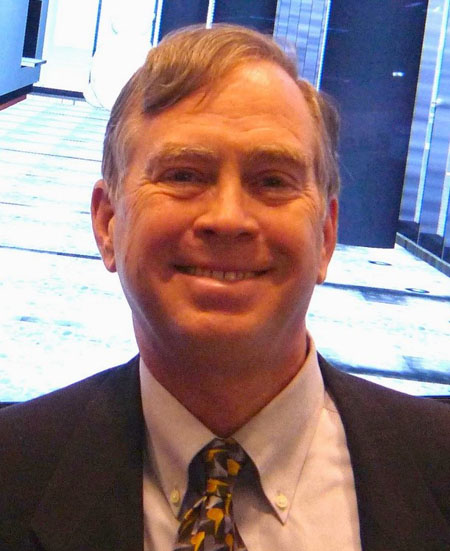
Prof. Thomas A. DeFanti
Distinguished Professor Emeritus, Computer Science, University of Illinois
Research Scientist, UCSD's Qualcomm Institute
Research Scientist, UCSD's Qualcomm Institute
Distinguished Professor Emeritus, Computer Science, University of Illinois
Bio: Thomas A. DeFanti, Ph.D, is a research scientist at UCSD’s Qualcomm Institute and a distinguished professor emeritus of Computer Science at the University of Illinois at Chicago. He received the 1988 ACM Outstanding Contribution Award and became an ACM Fellow in 1994. He co-founded StarLight in Chicago with Joe Mambretti and Maxine Brown. He and Dan Sandin conceived the CAVE virtual reality theatre in 1991. Since coming to UCSD in 2004, he and Greg Dawe built the StarCAVE, NexCAVE, TourCAVE, WAVE, SunCAVE, and CAVEkiosk VR systems. With John Graham, Phil Papadopoulos and teams of colleagues, Tom designs and builds 40/100 Gb/s state-of-the-art wide-area computer networked computing, storage, graphics processing and visualization facilities to serve advanced computing needs. He is co-PI of the NSF Pacific Research Platform project and the CHASE-CI NSF community infrastructure project for machine learning.
Keynote Title: Toward the Global Research Platform
Abstract: The US National Science Foundation-funded (award # 1541349) “The Pacific Research Platform (PRP)” to the University of California San Diego for 5 years starting October 1, 2015. It emerged out of the unmet demand for high-performing bandwidth to connect data generators and data consumers. The PRP is in its third year of building a broad base of support from application scientists, campus CIOs, regional network leaders, and network engineers, and continues to successfully bring in new, unanticipated science applications, as well as test new means to dramatically improve throughput. The PRP is, in fact, a grand volunteer community in an ever-expanding region where 35 CIOs and 50 application scientists initially signed letters of support for the original NSF proposal, all as unfunded partners. The PRP was scaled to be a regional program by design, mainly focusing on West Coast US institutions, although it now includes several long-distance US and transoceanic Global Lambda Integrated Facility (GLIF) partners to verify that the technology used is not limited to the size and homogeneity of CENIC, the regional network serving California.
There is pent-up demand from the high-performance networking and scientific communities to extend the PRP nationally, and indeed worldwide. This motivated the PRP to host The First National Research Platform Workshop in Bozeman, MT, in August 2017. At that meeting, a strong US and international community emerged, well documented in the report published on the PRP website (pacificresearchplarform.org).
This presentation will discuss will cover lessons learned from PRP applications, technology, and science engagement activities, as well as how best to align future PRP networking strategies with the GRP’s emerging groundswell of enthusiasm. The goal is to prototype a future in which a fully-funded multi-national Global Research Platform emerges.